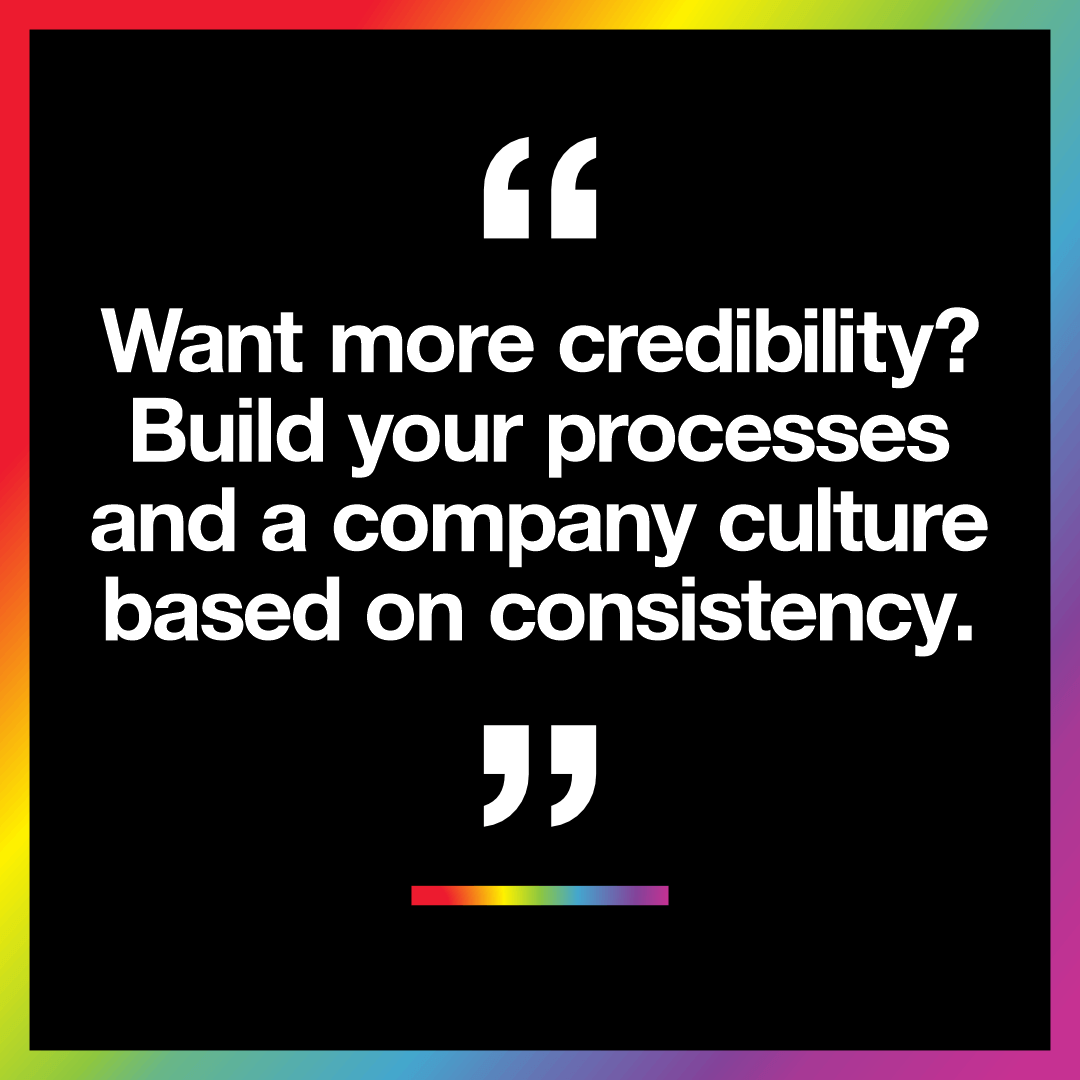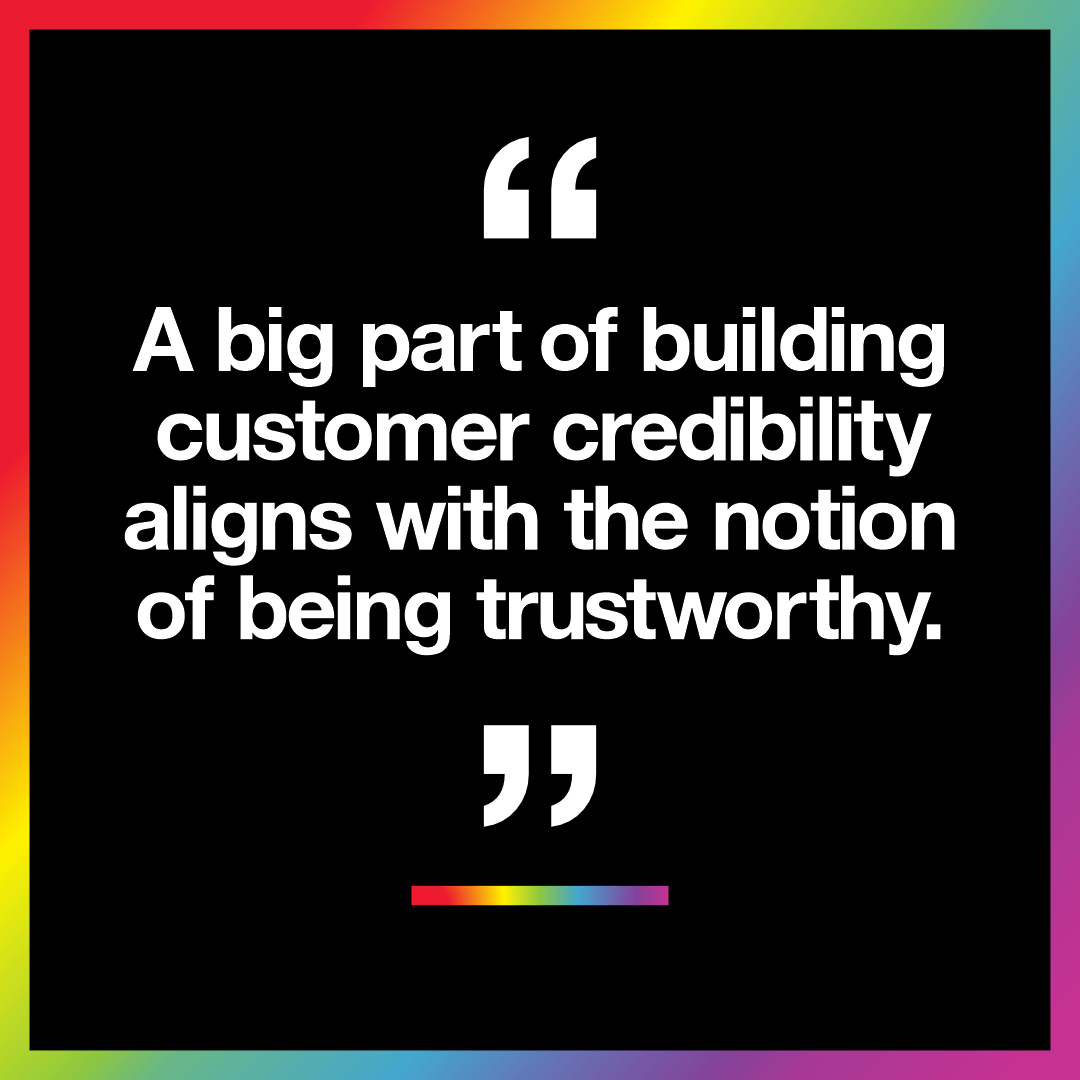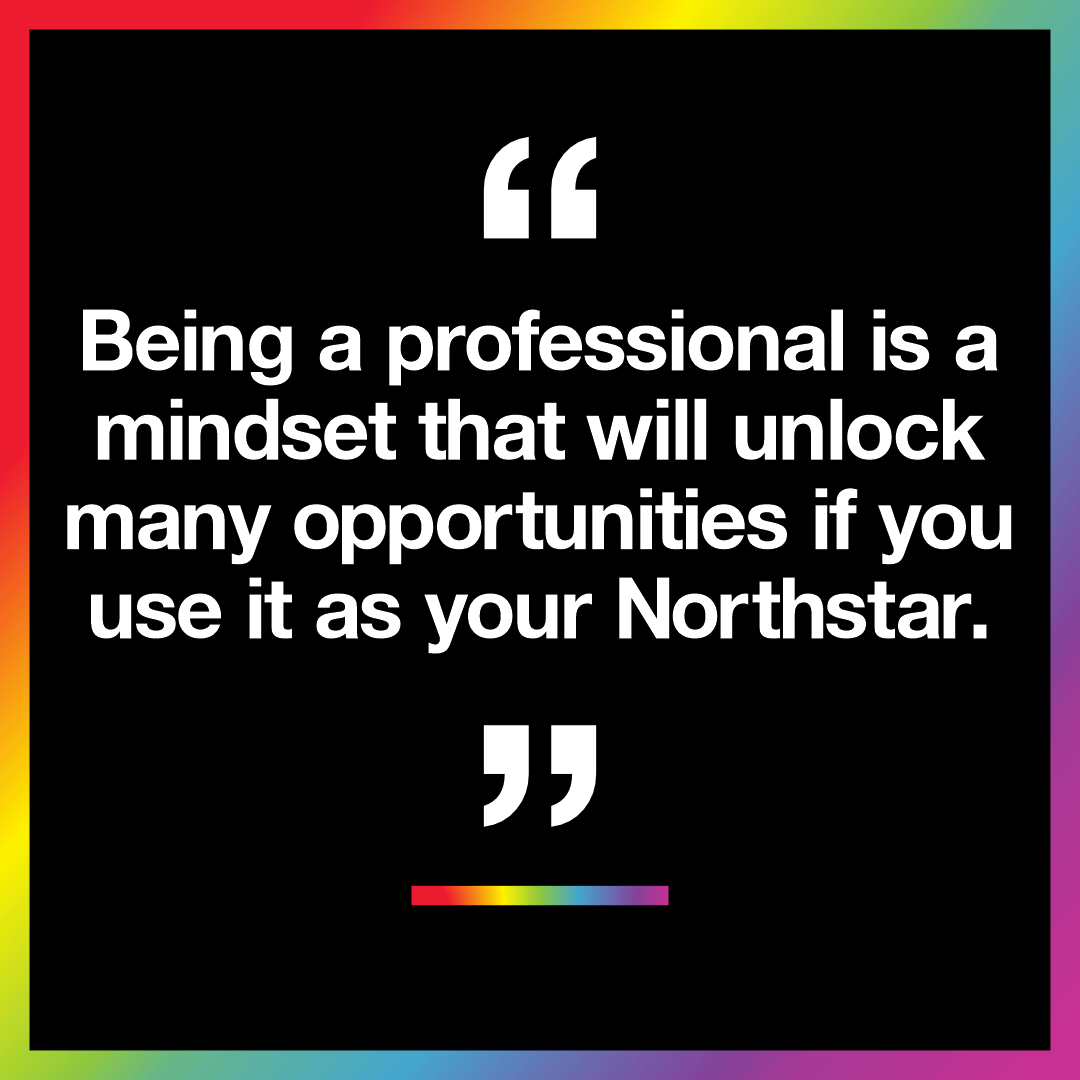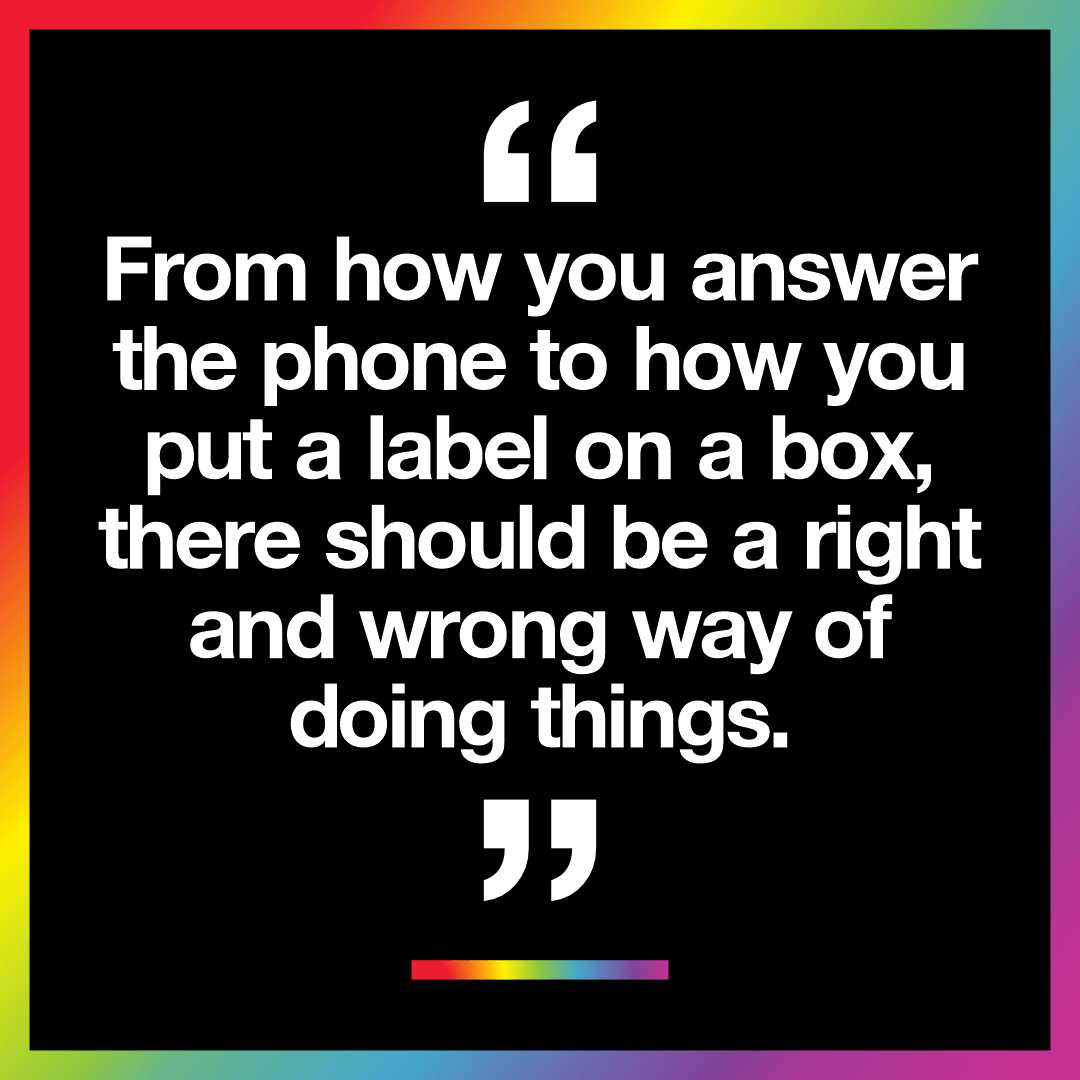How often are you thinking about credibility? Let's consider that from the viewpoint of the only people that matter: your customers. Credibility is simply Trust, with a capital "T."
Customers either trust you, or they don't. What are the essential tips for building credibility? So let's review seven things you need to foster more credibility with your customers.
There is only one you. People respond well to sincerity. What makes your company different from everyone else out there?
Your brand's voice is what gets noticed. When it feels genuinely authentic, customers respond positively by aligning themselves with an emotional attachment to that brand. They see themselves in it somehow.
This is the power that Apple, Harley-Davidson, Nike, and Peleton wield.
The reason why they dominate their market category is that everything they do is authentic to their brand. If you removed their logo from their marketing, I'll bet you would still think of them looking at the piece.
What makes your company authentic? It has to resonate truthfully with your customers. Take the brands that you enjoy in your life. Why do you always buy that same ice cream, car, phone, or shoe?
Authenticity isn't about price. It's about emotional alignment. That is what strengthens the credibility of your company with the customer.
Are you there for your customers? This is both from the customer service and a foundational emotional standpoint.
For example, let's say a client had a problem. What are the lengths you would go to solve it? Are you flexible enough to offer alternatives?
Yes, I realize that "client has a problem" is probably too general, but are you looking at the challenge from their point of view?
For example, a few years ago, a time-sensitive apparel order for an event was aboard a FedEx plane that crashed. We completely reordered and produced a duplicate order and got the shirts for the event in time to be handed out. Our actions said, "We got your back" more than anything that could be verbalized.
This is how not only lifelong customers are created, but ones that become your most significant marketing champions out there in the "real world."
What actions are you taking to generate this type of credibility daily?
If there are any lessons that someone could take away from the COVID pandemic is that everything can change instantaneously. Basically, as soon as the NBA canceled their games in March of 2020, the entire world seemingly followed suit. Imagine professional basketball being the canary in the coal mine for trends in health and safety!
What followed was chaos. Entire industries were wiped out. Workers everywhere were disrupted.
Embedded in that chaos, though, were opportunities. People willing to do something new or change how they operate found success. For some, that genie isn't going back into the bottle.
This happened by experimenting and learning. Being open to change, trying new things, failing, and then improving.
It all happened relatively quickly too. FYI, to this day, my family still orders our groceries on a tablet, swings by, and picks them up. Now, it has less to do with health reasons and more to do with the convenience factor.
Were all the orders perfect? Of course not. But, the credibility happened when they made things right. Or suggested alternatives.
What is interesting now is that the stores are learning what we order. Occasionally, some free samples are tucked in with the order for products to try. They know that as consumers, we are not wandering around the store looking at the end cap displays or drifting by the free sample table.
Once you understand your customer and have some data, what are you doing with that? How can you apply what you have learned from them to build a better relationship or sales engagement?
I shouldn't have to say this. As we all know, "Honesty is the best policy." However, when stressed, people throw out all sorts of words that may or may not be entirely valid.
Remember this. It is ok to say no.
Customers and employees would rather know the truth in a situation than a mealy-mouthed excuse as to why something can't happen.
For most of my entire career, I've been on the operational end of the stick. Salespeople are notorious for agreeing to things not based on actual physical reality. Why? Because they don't want to "lose the sale."
They agreed to that rush order, even though the production schedule was already overbooked. They don't have to stay late to get it out, so why not? But when push comes to shove and that order misses the ship date, all that happens is a lot of finger-pointing internally and a customer that doesn't trust you.
Want more credibility?
Don't agree with things that aren't feasible. For example, "I'm sorry, checking our schedule, it looks like Friday won't work, but the following Thursday shouldn't be a problem." Maybe the customer needs that order on Friday, but perhaps Thursday is just as good.
But when you use the truth in the situation as a guideline, you are not setting yourself up for failure or mistrust if things go south. When your shop gets the industry reputation for hitting deadlines, that always drives more customers to your door.
What doesn't work is angry customers. When you agree to a production deadline and fail, those customers aren't returning and might even flame you publicly online."I'm sorry, I can't take that order due to the timeline and parameters of the job. But… here's what I can do…" is always how to handle it. Your credibility is wrapped up in the truth that you deliver.
People always want to know what to expect. Most folks hate irregular outcomes, confusion, or spotty service.
Want more credibility? Build your processes and a company culture based on consistency.
When you not only show up but are excellent in what you do, you will instantly be in the top echelon of companies out there.
Why?
Because most of your competition can't deliver at that level. This means executing excellence in every detail. All the time.
From how you answer the phone to how you put a label on a box, there should be a right and wrong way of doing things.

As a discussion point, I want you to consider the word "remarkable." Remarkable means that other people are so impressed with something that they will talk about it.
So, here is a question for you. Is your company so consistently excellent that your customers constantly talk about you? Are your current customers delivering new customers to your door?
If not, chances are something is missing. I'll bet that it is something to do with consistency.
Remember, everything you do is filtered through the eyes of your customers. Therefore, a big part of building customer credibility aligns with the notion of being trustworthy.
This means that you keep your promises. For example, "I'll shoot you that quote in about an hour." But it doesn't go out until tomorrow morning. So even though you spend time checking inventory or trying to solve a problem, it is a mental failure to your customer.
When you don't keep your word, that affects the mental picture someone has of you, regardless of the reasons.
While you are working on the problem, don't go radio silent! Instead, shoot them a quick message that says, "Hey, I" m checking on a few things for this order, and it is taking longer than expected. However, I should know something soon. Hopefully by the close of business, but it could be tomorrow."

That's all it takes.
The issue here is that people make up stories in their heads about what is going on when they don't hear from you. Status check-ins are a great way to build the trustworthiness you want with a customer.
A great example is that you can track the actual vehicle with many different types of businesses, from pizza delivery to air conditioning service to windshield replacement. "Where are they?" apps feed the need for what's happening.
How are you building more trust with your customers by providing them with status updates and information before they ask for it?
I've saved the best for last. So many people in this industry operate out of their garage, basement, or spare bedroom. There is nothing wrong with that. Apple was famously founded in a garage. So was Disney. Facebook was launched from a dorm room.
Where you start has less of an impact than what you do.If you are stuck on what to do next, the simple phrase, "What would a professional do?" is an excellent place to start working on the solution. Being a professional is a mindset that will unlock many opportunities if you use it as your Northstar.

For example:
If you want your company to be more credible, then consider how you relate to the mindset of being a professional.
I'm not talking about how you look or dress. Instead, your focus should be on the intended outcome and the results you deliver for your customer. So in every step of your business, from how you quote to how you ship a box, ask if this is the most professional way to handle it?
Chances are there is something better out there. The fun part is searching and finding new things to make something better.
That's what drives credibility.
